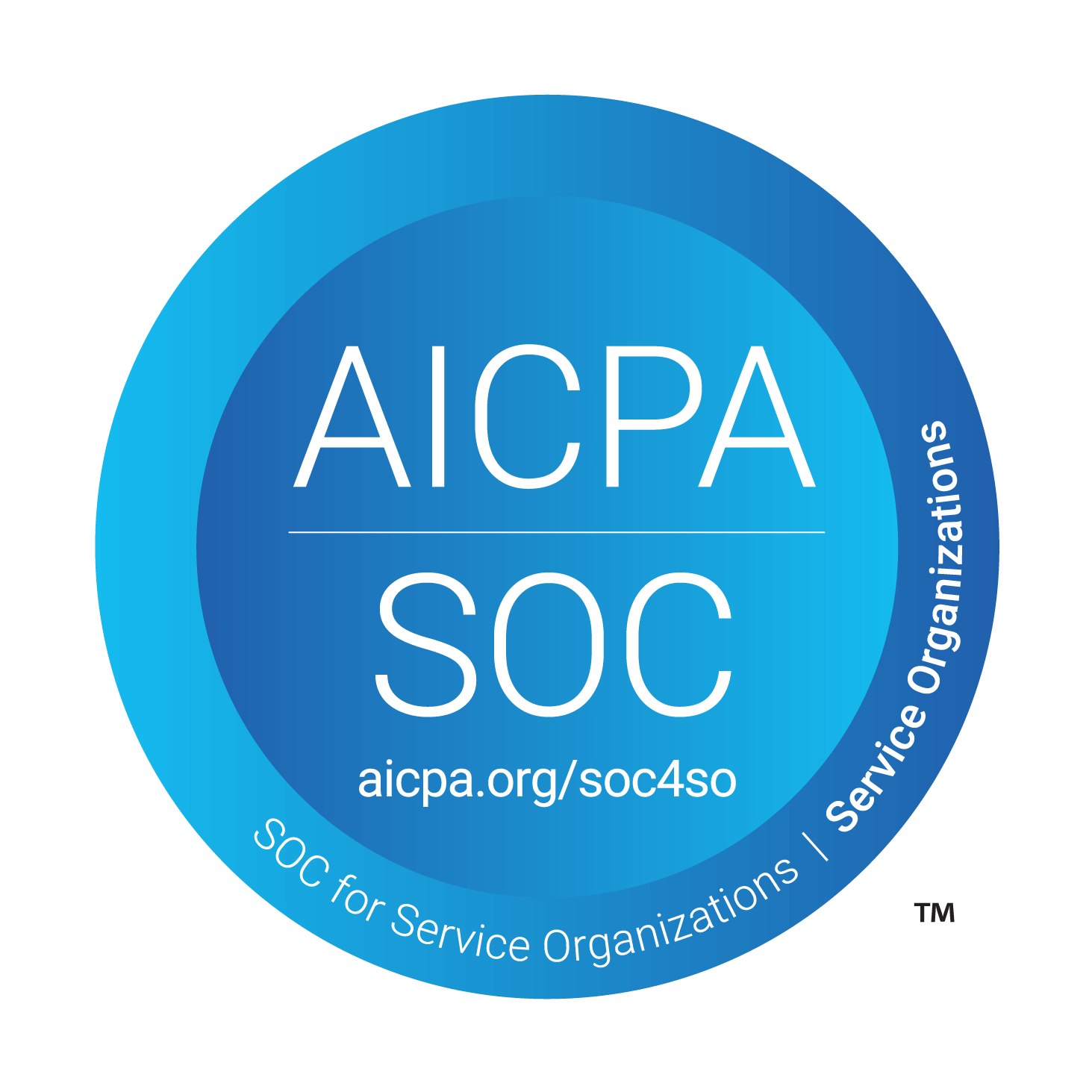Getting compliant isn’t the fun part of building a company - but it can decide whether your next deal closes or dies. If a client asks for your SOC 2 report and you don’t have one, the conversation usually ends fast.
That’s why tools like OneLeet and Delve exist. Both promise to make compliance faster and easier, but once you dig into OneLeet vs Delve, you’ll find they’re built on two completely different mindsets:
One focused on lasting security - the other on AI-powered speed and ease of use.
So which fits your way of working? Do you want airtight security from day one, or are you just hoping to get that SOC 2 badge to move forward?
Before we talk about OneLeet vs Delve pricing or setup, let’s zoom out. A SOC 2 compliance checklist might look like a list of tasks - policies, access controls, vendor checks - but in reality, it’s a full-time job. The right platform can take that off your hands.
The question is: which approach gets you there better?
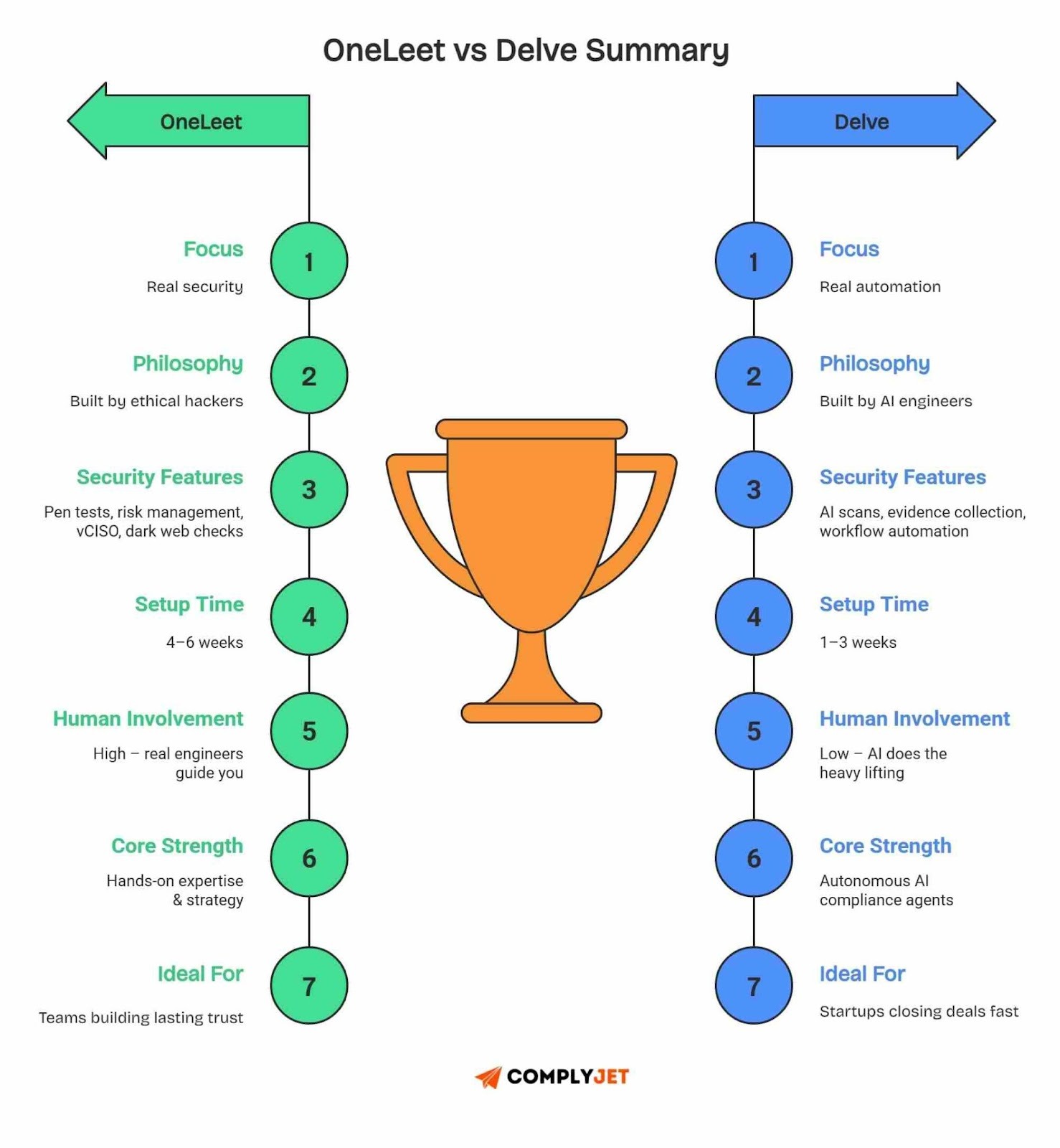
What’s All This Talk About Compliance Theatre?
No one starts a company thinking about compliance. You’re focused on growth - until that first enterprise deal hits pause for a security review. Suddenly, you’re talking about access logs and audit trails instead of product roadmaps.
That’s when most teams slip into compliance theatre - ticking boxes, grabbing a random SOC 2 compliance checklist, and calling it a day. On paper, everything looks fine. But underneath, it’s just decoration.
It works for a while - until a client asks deeper questions or a real security issue pops up. Then it’s clear the checklist didn’t make you secure, just compliant on paper.
There are only two real ways out of the compliance theatre: build real security or build real automation.
And that’s exactly where OneLeet vs Delve take different paths - two philosophies solving the same problem in completely different ways.
Meet OneLeet
OneLeet was built by people who used to break into Fortune 500s for a living - ethical hackers who realised something was off. Companies weren’t failing because they skipped audits; they were failing because compliance had become theatre. So they flipped the script: real security first, compliance second.
Instead of starting with paperwork or a SOC 2 compliance checklist, OneLeet starts with your actual systems - cloud, code, devices, and vendors. It finds what’s weak, helps you fix it, and turns those fixes into audit-ready proof.

Their platform brings everything under one roof:
- Unified control management and automated evidence collection.
- Real-time device monitoring and built-in risk management.
- Continuous scanning and expert-led penetration testing by OSCE-certified pros.
- On-demand vCISO guidance for long-term strategy.
The company grew profitably to eight-figure revenue before raising a $33M Series A. Their goal is simple - make real security easier, cheaper, and faster than fake compliance ever was. With OneLeet SOC 2 compliance, you’re not just chasing an audit; you’re building a security culture that lasts.
Enter Delve
Delve takes the opposite path. Where OneLeet builds security from the ground up, Delve builds automation that does the work for you. Founded by two MIT classmates, Karun Kaushik and Selin Kocalar, the idea began with an AI medical scribe - until HIPAA compliance showed them just how painful manual audits could be. That pivot turned into Delve’s mission: automate compliance from end to end.
Delve’s secret sauce is its network of autonomous AI agents that act like teammates. They collect screenshots, gather evidence, and fill audit forms automatically, cutting compliance time from months to weeks.

Highlights include:
- AI-driven evidence collection and daily infrastructure scanning.
- Security questionnaire autofill to speed up enterprise reviews.
- Instant Slack support from compliance experts.
- Custom workflows for startups, mid-market teams, and enterprises.
With Delve SOC 2 compliance, the platform focuses on getting you audit-ready fast - without drowning you in busywork. And while we’ll talk about Delve pricing later, it’s clear that their pitch isn’t just speed. It’s peace of mind through automation.
P.S. - Did you know even Delve recently secured a $32M Series A funding, valued at a whopping $300M?
OneLeet vs Delve: The SOC 2 Showdown
When it comes to SOC 2 compliance, both platforms aim for the same finish line - a clean audit report - but they take completely different routes to get there.
OneLeet SOC 2 Compliance
With OneLeet SOC 2 compliance, the process feels more like a guided security upgrade than a compliance sprint. OneLeet helps you implement every control properly before the auditor even steps in. Most companies spend 30–60 hours over four to six weeks getting their controls in place, depending on size and setup.
Once that’s done, the real test begins - the Type 2 audit. It includes a three-month observation period that checks if your security controls actually hold up in practice.
OneLeet usually recommends skipping the quick Type 1 audit altogether, since most enterprise clients care about the gold-standard Type 2 report anyway. The result is slower than a quick-fix platform, but you end up with genuine, audit-ready security - not just compliance on paper.
Delve SOC 2 Compliance
Delve SOC 2 compliance takes a completely different approach. Instead of building from the ground up, it uses AI agents to do the groundwork for you. These agents collect screenshots, logs, and audit evidence automatically, slashing the time teams spend on manual prep.
Startups can usually finish onboarding in under an hour and be audit-ready within weeks. The process is faster because Delve removes human bottlenecks - automating evidence collection, questionnaire responses, and even control validation. It’s built for founders who need SOC 2 as soon as possible to keep deals moving, without hiring a dedicated compliance team.
Basically, OneLeet vs Delve isn’t about who gets you compliant - both do. It’s about how you get there. OneLeet is about trust built on security. Delve is about speed built on automation.
The Realistic OneLeet vs Delve SOC 2 Timeline
Founders rarely ask “what does it do?” - they ask “how long will it take?”
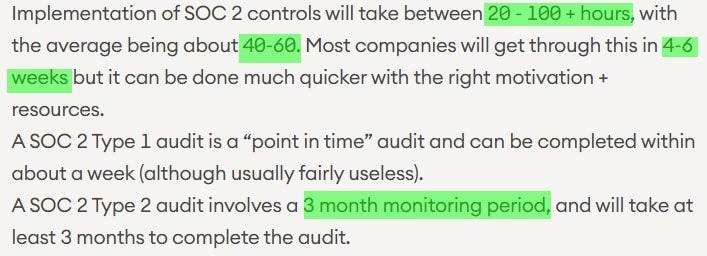
If you start with OneLeet SOC 2 compliance, expect about a month of guided setup before your audit window even begins. Most teams wrap implementation in four to six weeks, followed by the standard three-month Type 2 audit period. It’s steady, structured, and designed for companies building long-term trust.
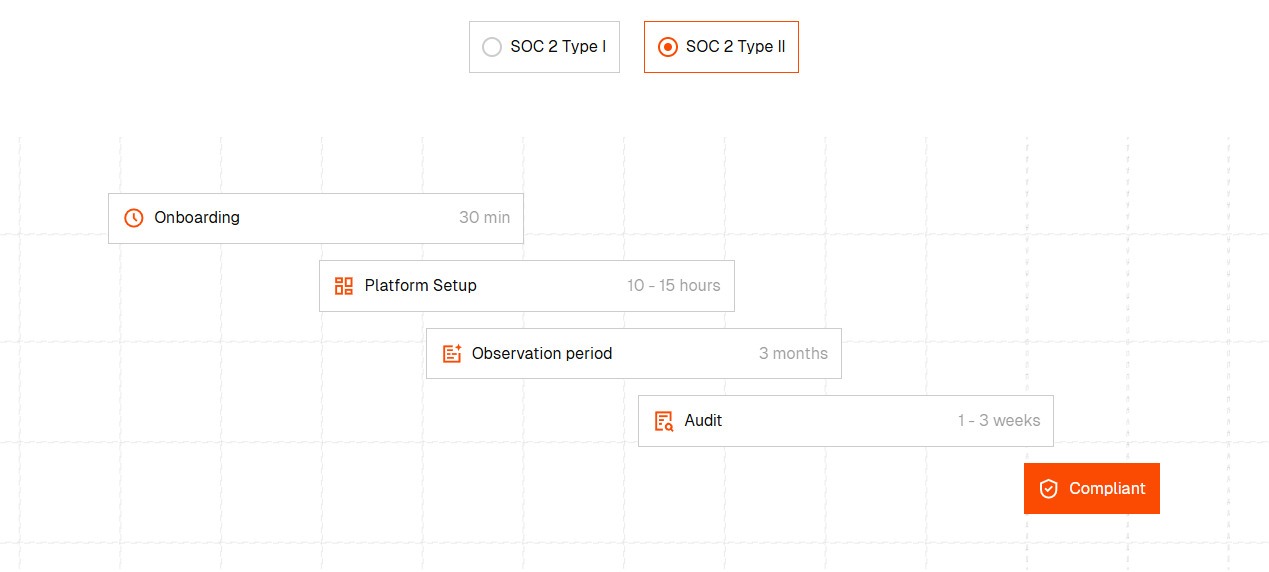
With Delve SOC 2 compliance, the ramp-up is almost instant. Onboarding takes 30 minutes. Another 10-15 hours give or take for setup, followed by the 3-month observation period. The system’s AI agents start collecting and validating evidence right away. You can expect to be audit-ready in as little as 1 to 3 weeks.
So when comparing OneLeet vs Delve, think of it this way - OneLeet runs a marathon, Delve runs a sprint. Both cross the finish line, just on very different clocks.
OneLeet vs Delve: Feature by Feature
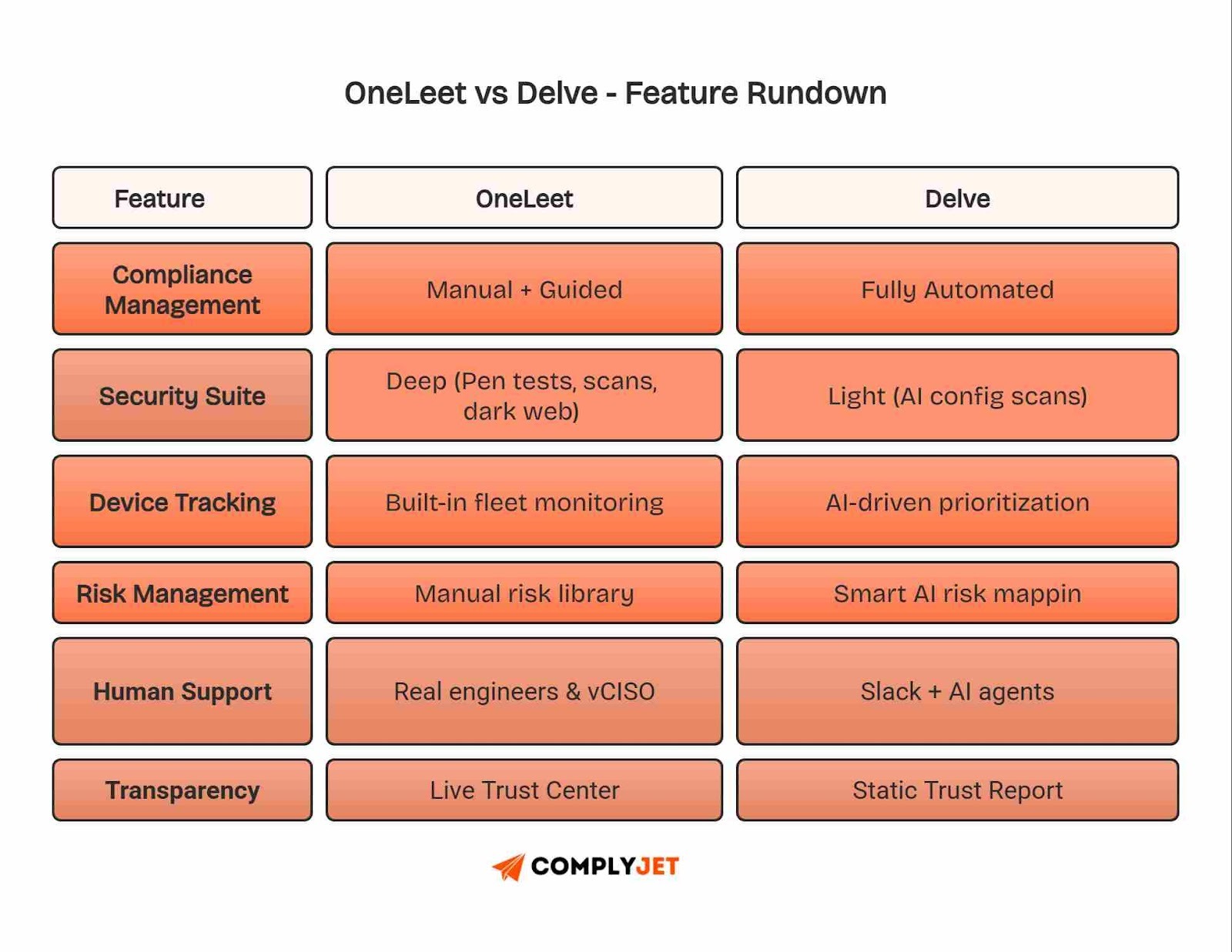
Both platforms promise to make compliance simple. But when you look closer, OneLeet vs Delve aren’t even playing the same game. OneLeet feels like a complete “security command center” (in their own words); Delve feels like an AI-powered assistant built for speed. Here’s how they really stack up:
1. Compliance Management
OneLeet
OneLeet gives you a single dashboard for everything - policies, controls, risks, and evidence. Every fix you make inside the platform becomes proof for your auditor. It’s all interconnected: update a control, and your documentation updates automatically.
Delve
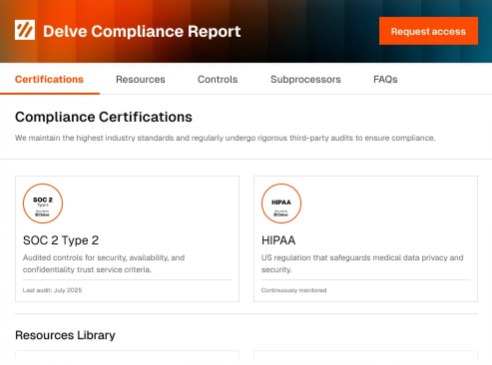
Delve, on the other hand, automates this layer. Instead of asking you to manage controls yourself, its AI agents do the busywork - collecting screenshots, checking logs, and updating audit trails in real time. It’s less manual tracking, more autopilot.
2. Security Suite
OneLeet
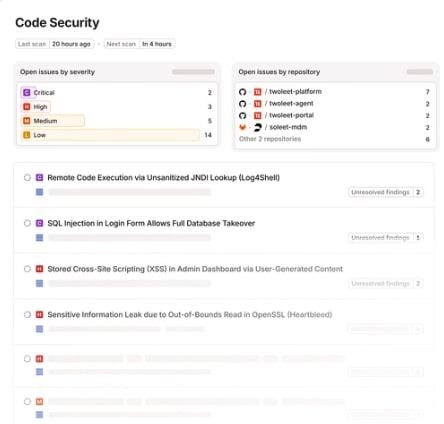
OneLeet isn’t just a compliance tool - it’s a full cybersecurity suite. You get attack surface monitoring, code scanning, vulnerability alerts, and even dark web exposure checks. Its OSCE-certified team leads deep penetration tests, simulating real-world attacks to find weaknesses before hackers do.
Delve
Delve doesn’t go that deep into live security. It focuses more on continuous compliance monitoring - AI scanning your infrastructure daily for misconfigurations or compliance drifts. It’s proactive, but more automated than manual.
3. Risk & Device Management
OneLeet
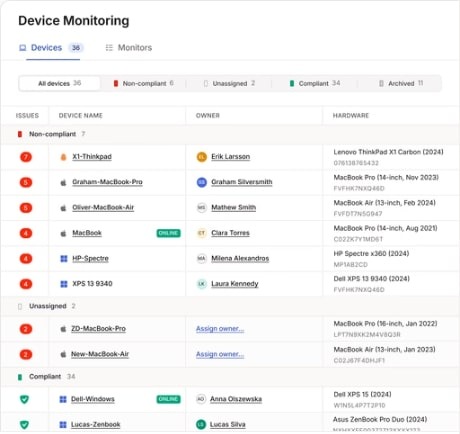
OneLeet comes with built-in company device monitoring - it tracks every laptop’s security settings in real time, flags gaps, and automatically adds that as audit evidence. It also offers a dynamic risk library to help you prioritise what’s actually worth fixing.
Delve
Delve handles risk differently. Its AI learns your setup, context, and integrations, then customises which risks matter most. It’s less about fleet tracking, more about data-driven prioritisation.
4. Human Expertise vs. AI Automation
OneLeet
This is where the two diverge most. OneLeet is run by experts - real security engineers who manage your audits, pen tests, and vCISO strategy. You’re buying leadership, not just software.
Delve
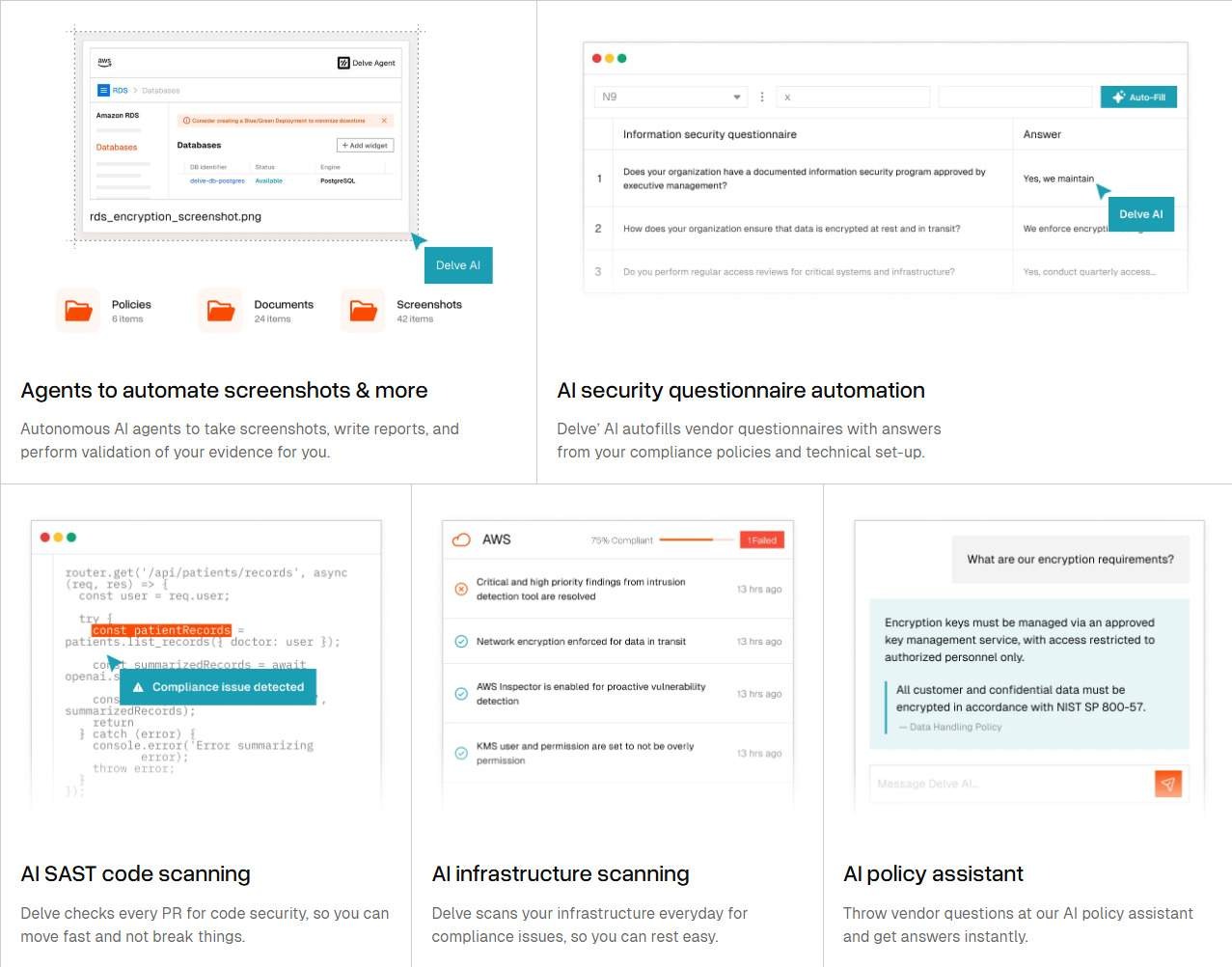
Delve, in contrast, leans into pure automation. It’s like hiring a small army of AI assistants - they collect, validate, and report without much human touch. You still get access to 1:1 Slack support, but humans only step in when the AI can’t.
5. Trust & Transparency
OneLeet
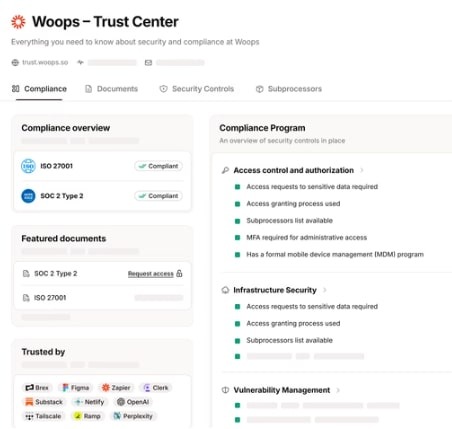
OneLeet offers a live Trust Center - a public page where you can securely share your compliance documents and real-time status with customers. It’s proof you’re not just compliant; you’re transparent.
Delve
Delve has a similar idea with its Trust Report, but it’s more one-time than ongoing - a downloadable compliance snapshot meant to speed up enterprise reviews rather than continuous visibility.
6. Integration & Ecosystem

Both tools integrate with your existing stack - cloud providers, code repos, identity systems, productivity tools. The difference? OneLeet uses integrations mainly to strengthen security monitoring, while Delve uses them to teach its AI what’s relevant, so it can fill in forms and evidence automatically.
You can say, OneLeet vs Delve isn’t a “better vs worse” comparison - it’s “depth vs speed.”
The Framework Rundown
When it comes to supported frameworks, OneLeet vs Delve both cover the usual suspects - SOC 2, ISO 27001, HIPAA, GDPR, PCI DSS - but the difference lies in how they handle them.
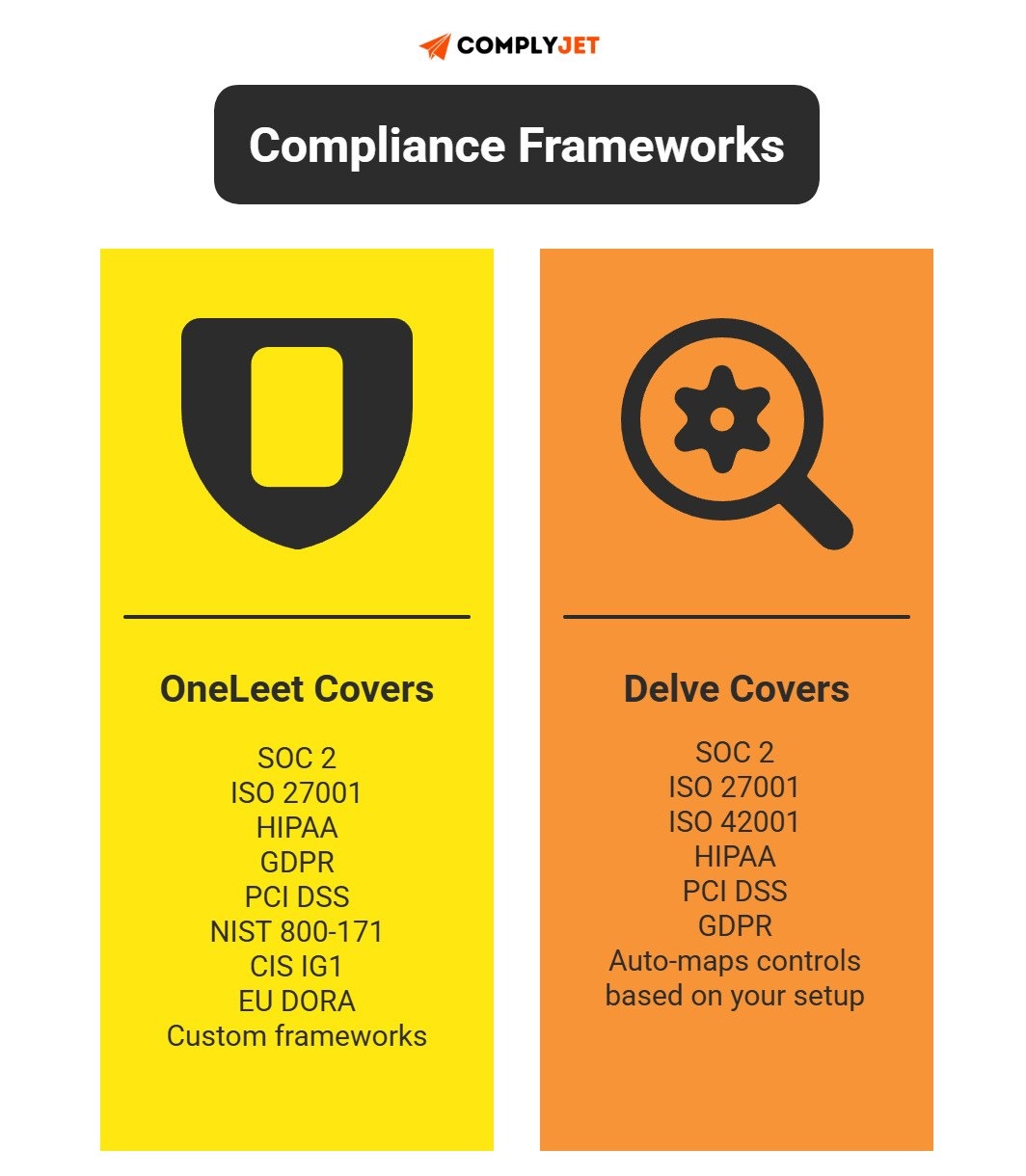
OneLeet
OneLeet is built for companies that need multiple frameworks managed under one roof. It supports SOC 2, HIPAA, ISO 27001, GDPR, PCI DSS, NIST 800-171, CIS IG1, EU DORA, and even custom frameworks. Everything runs through the same control management system, so one change updates across all frameworks.
It’s designed for scaling teams that want to expand compliance without starting from scratch each time.
Delve
Delve focuses on automation across frameworks rather than deep manual configuration. It supports SOC 2, HIPAA, ISO 27001, ISO 42001, PCI DSS, GDPR, and more - and customises controls automatically based on your company’s size, risk tolerance, and existing setup. In short, you don’t manage the frameworks - the AI does.
The difference?
OneLeet offers breadth with control, while Delve offers breadth with automation. Both get you certified - the question is whether you want to fine-tune every framework or let AI handle the knobs.
Let’s Talk Money
If there’s one part that feels like a guessing game, it’s SOC 2 pricing. Both platforms talk about simplicity - until it’s time to know what it actually costs.

Whether you check Delve pricing or OneLeet pricing, you’ll hit the same wall: a “Book a Demo” button. No public pricing page, no ranges, not even ballpark figures. Everything’s custom, which sounds flexible - but really just means you won’t know what you’re signing up for until the sales call.
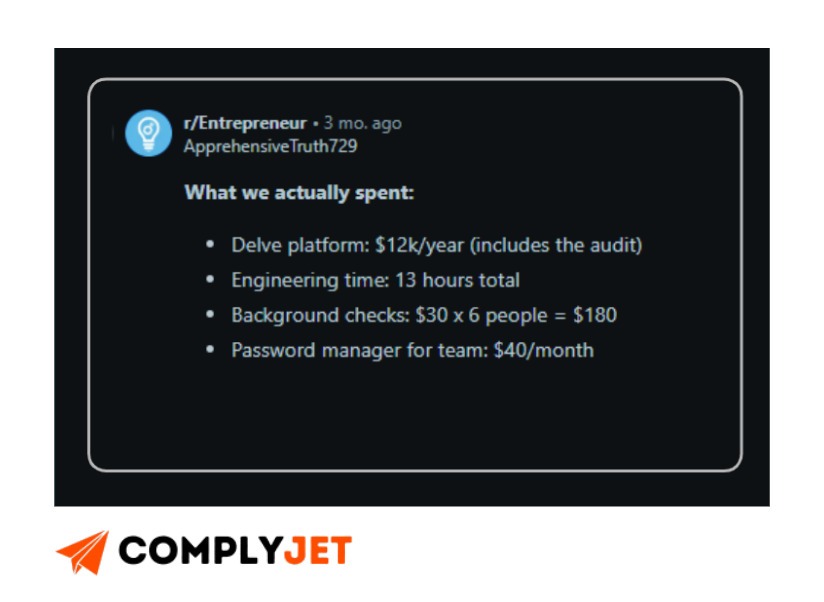
To be fair, both tools work with companies of all sizes, so pricing does vary. But for founders comparing budgets, it’s a major slowdown. On Reddit, one user mentioned paying around $12,000 per year for Delve, which gives you a rough sense of what “custom” might mean in practice.
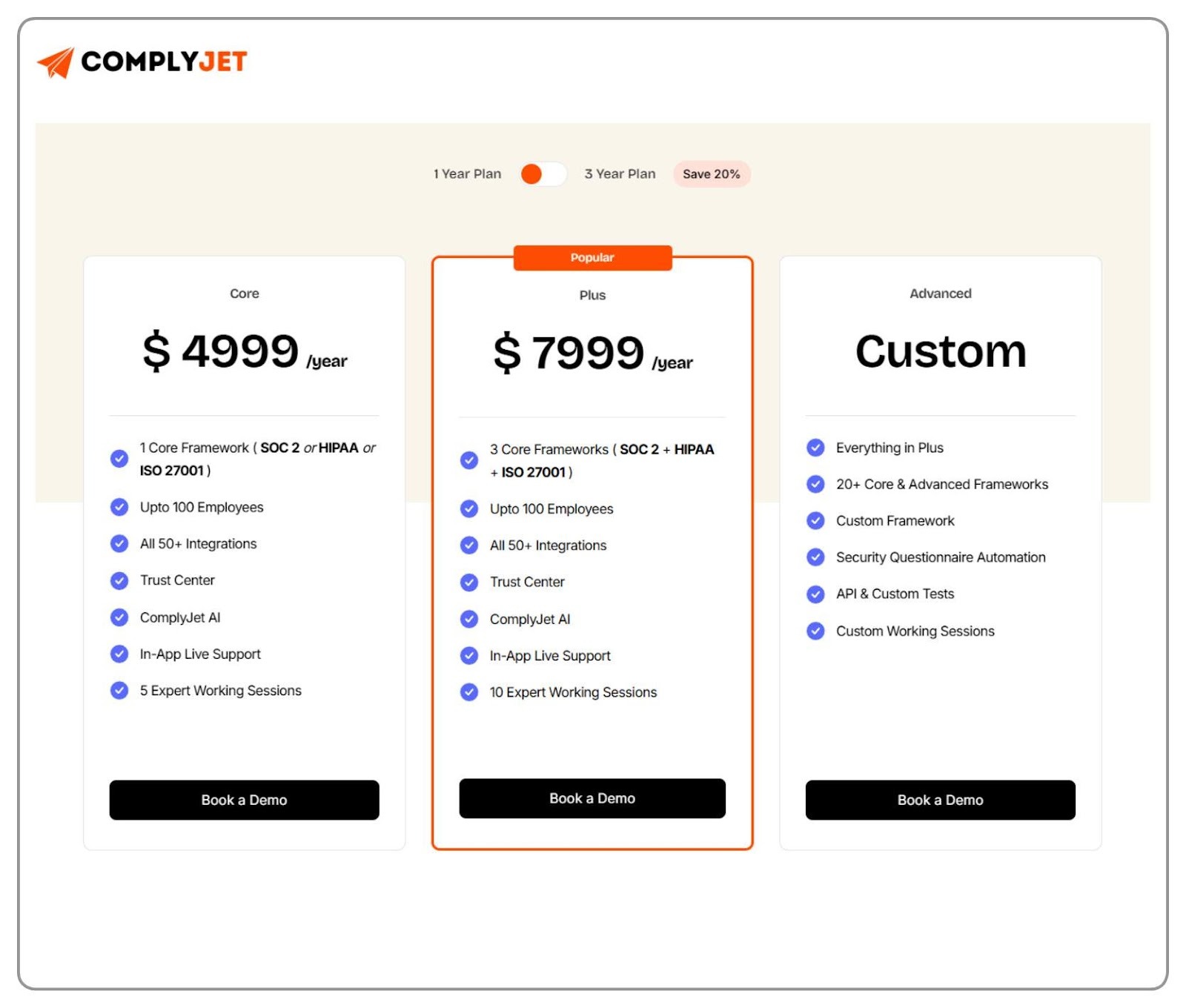
This is exactly where we’ve chosen to do things differently. Complyjet’s pricing is fully transparent - right there on the website, no demos or fine print. You know what you’re paying for, how long it’ll take, and exactly what you’ll get. It’s simple, predictable, and honestly how compliance pricing should be.
Because when it comes to OneLeet vs Delve pricing, the lack of clarity is the real cost.
The Word on the Street
Feature lists look great on landing pages, but what really matters is how these tools feel when you’re knee-deep in SOC 2 controls and audits. Real founders and security teams on G2 and Reddit have plenty to say - and it paints a pretty clear picture of how OneLeet vs Delve compare in the real world.
OneLeet
From G2’s OneLeet reviews, one theme keeps coming up - clarity. Users say OneLeet SOC 2 compliance feels like having a coach. It breaks big tasks into simple steps and actually helps you understand why each control matters.
What founders like most:
✔ The team knows real security, not just compliance rules.
✔ They reply fast and are very helpful.
✔ The platform is easy to use and saves time.
✔ Reports are clear and trusted by clients.
✔ It helps improve real security, not just pass audits.
✔ Evidence collection and tracking are almost automatic.

What could be better:
⛌ They want more integrations with other tools.
⛌ Dashboards and reports could be more customizable.
⛌ Some say the interface feels a bit rigid.
⛌ A few mention the price is higher, but worth it.
The takeaway? OneLeet’s strength is empathy. It feels like it was built by people who’ve actually done compliance - not just sold it.
Delve
On G2’s discussions and one particularly passionate Reddit thread, Delve gets love for its speed and polish, especially during onboarding. In most OneLeet vs Delve reviews, teams say they were up and running in under a day and appreciate the strong audit-prep tools. But there’s nuance - some say it can feel a bit heavy once setup begins.
What founders like most:
✔ The team is fast, helpful, and always available.
✔ Easy-to-use and intuitive platform.
✔ Helps achieve SOC 2, ISO, and HIPAA quickly.
✔ Strong AI features and automation make work simpler.
✔ Feels like a true partner, not just a tool.
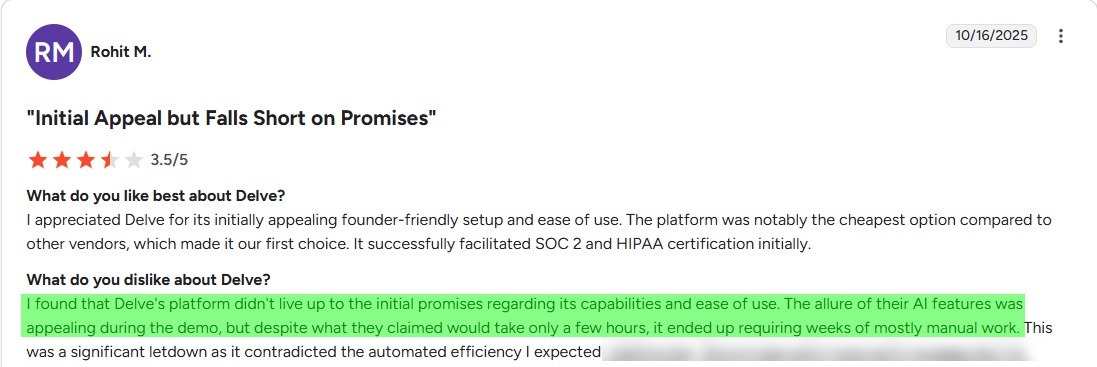
What could be better:
⛌ One user said the automation was oversold and required too much manual work.
⛌ Some early limits in available compliance frameworks.
⛌ A few felt the sales pitch was too pushy.
Overall, the difference is clear. OneLeet wins on usability and hands-on guidance, while Delve wins on automation and speed. Is your SOC 2 compliance checklist already familiar territory? Then, Delve will fit right in. Are you new to the process? In that case, OneLeet might feel more human.
And that’s the real story of OneLeet vs Delve - not which one looks better in a demo, but which one you’ll still enjoy using three audits later.
Still Deciding Between OneLeet vs Delve?
At this point, the difference between OneLeet vs Delve is pretty clear. OneLeet is for teams that want lasting security - not just a certificate. Delve is for teams that want to move fast and automate as much as possible.
If you care about real, audit-ready protection, OneLeet SOC 2 compliance gives you structure and expert guidance. If you care about speed, Delve’s AI agents get you compliant faster - but you’ll trade some control for convenience.
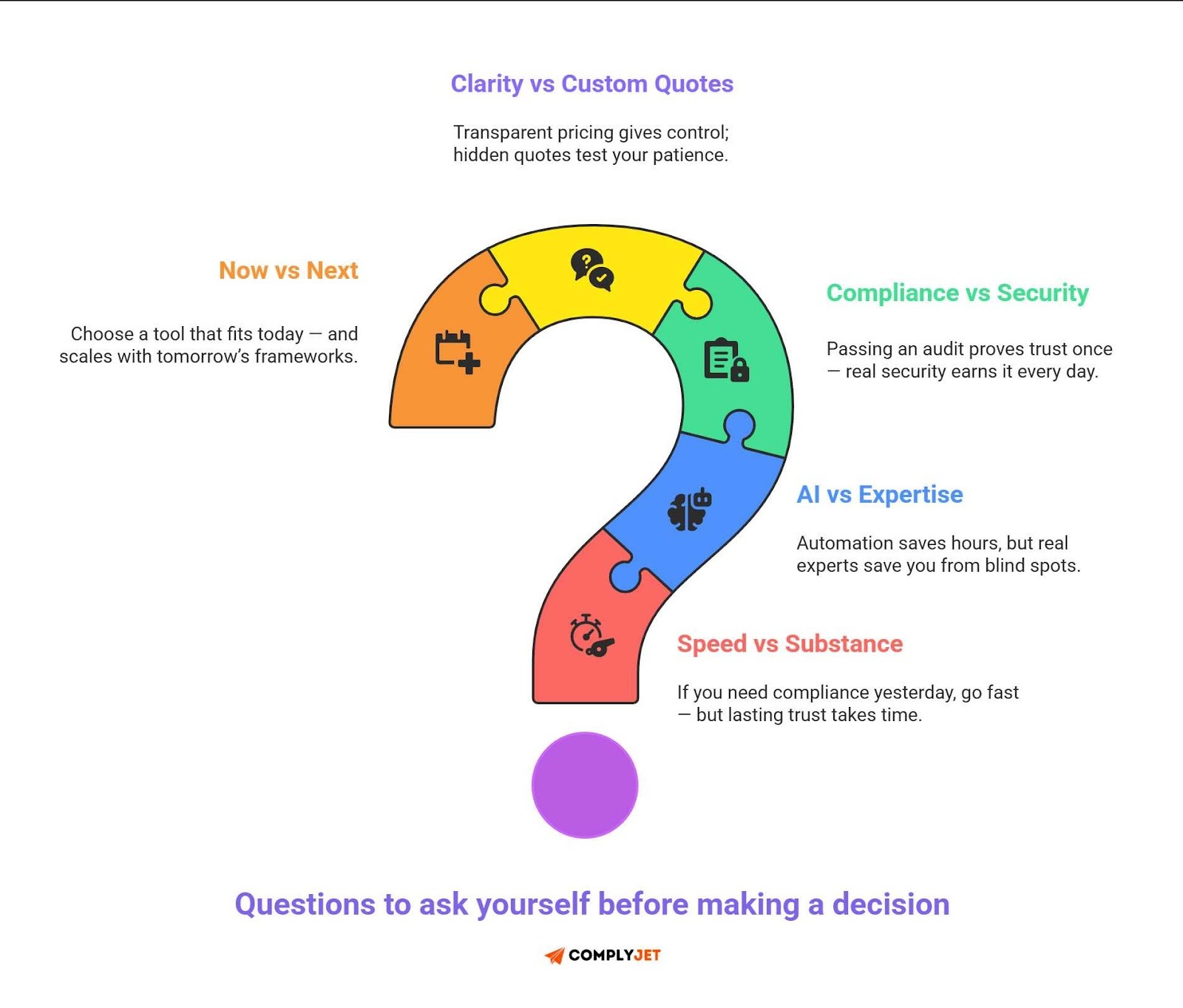
As for OneLeet pricing, it’s still behind a “Book a Demo” wall like Delve’s. Both are built for different types of founders, but the right choice really comes down to what you value more: depth or speed.
Either way, both tools prove the same point - compliance doesn’t have to be painful, just better designed.
FAQs: Founders’ Most Common Questions
Do I really need SOC 2?
If you handle customer data - yes. SOC 2 isn’t optional anymore. It’s how big clients decide who they can trust. Even early-stage startups are expected to have it before signing deals.
How long does SOC 2 take?
It depends on the platform and your setup. Delve SOC 2 compliance can get you audit-ready in weeks, while others like OneLeet take longer but go deeper. Tools like Complyjet now promise a 7-day turnaround, showing just how fast the process can be done right.

Is AI-based compliance safe?
It can be, if it’s used for automation and not decision-making. AI helps reduce grunt work, but real expertise still matters.
What if I switch vendors later?
You can. Your SOC 2 data - policies, controls, and reports - belongs to you. Just make sure your next platform supports clean migration.
Can I get multiple frameworks done together?
Yes. Many modern tools map overlapping controls automatically, so you can manage SOC 2, ISO 27001, and HIPAA in one go.
In the OneLeet vs Delve debate, the tools differ in depth and speed - but the right choice comes down to how fast you need to show proof and how hands-on you want to be.
Final Takeaway
If you’ve made it this far, you already know - compliance isn’t about ticking boxes, it’s about building trust. Getting ready for SOC 2 can feel endless - policies, vendors, audits, and that dreaded SOC 2 compliance checklist that keeps growing every week. But the truth is, it doesn’t have to be this painful.
That’s what the OneLeet vs Delve story really shows. Both work, depending on what kind of company you’re building and what matters most right now.
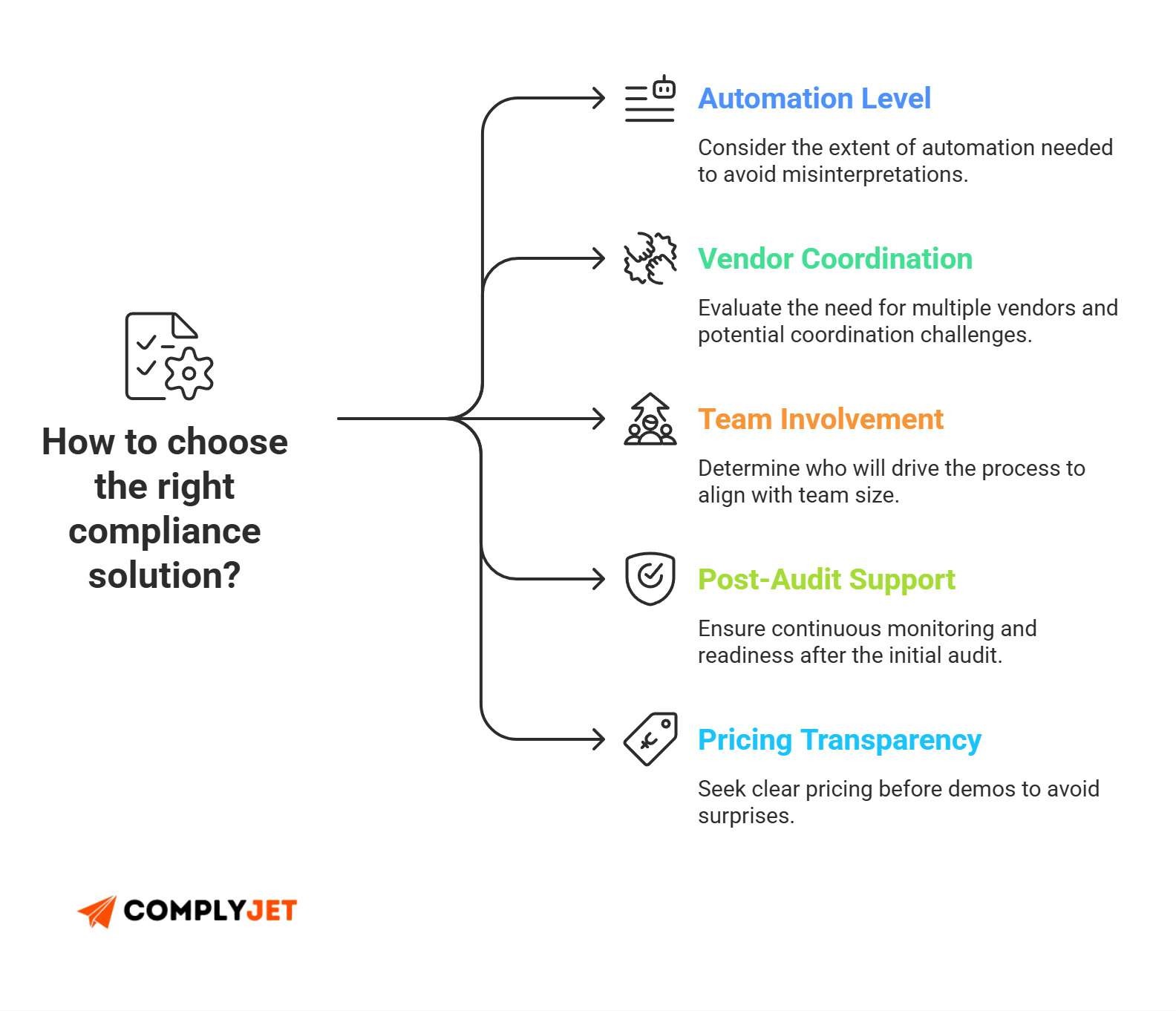
But here’s the thing - comparing features or trying to decode Delve vs OneLeet pricing shouldn’t take longer than the audit itself. You shouldn’t have to “Book a Demo” just to learn if a platform fits your budget or timeline.
That’s why Complyjet does it differently. You can still book a demo or talk directly to the founders, but you’ll also see transparent pricing right on the website. No surprises, no mystery quotes - just clear numbers, fast 7-day compliance, and a team that cares about helping you close that next deal.
Let us help you get certified - and get back to building what really matters. Book a demo and let us take you through how things work around here.
.png)
